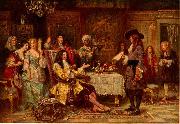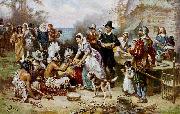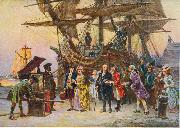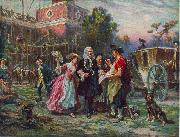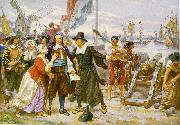|
||||||||||
|
|
||||||||||
|
The Birth of Pennsylvania 1680 Pintura Identificación:: 73404 Vea nuestra galería en Suecia |
The Birth of Pennsylvania 1680 Oil on canvas cjr Oil_on_canvas cjr |
|||||||||
|
|
||||||||||
|
The First Thanksgiving Pintura Identificación:: 73552 Vea nuestra galería en Suecia |
The First Thanksgiving ca. between 1912(1912) and 1915(1915) Oil on canvas cjr ca._between_1912(1912)_and_1915(1915) _ Oil_on_canvas _ cjr |
|||||||||
|
|
||||||||||
|
Franklin's Return to Philadelphia, 1785 Pintura Identificación:: 73964 Vea nuestra galería en Suecia |
Franklin's Return to Philadelphia, 1785 Franklin's Return to Philadelphia, 1785 Oil on canvas cjr Franklin's_Return_to_Philadelphia,_1785 _ _Oil_on_canvas _ cjr |
|||||||||
|
|
||||||||||
|
Building the Cradle of Liberty Pintura Identificación:: 73965 Vea nuestra galería en Suecia |
Building the Cradle of Liberty Building the Cradle of Liberty Oil on canvas cjr Building_the_Cradle_of_Liberty _Oil_on_canvas _ cjr |
|||||||||
|
|
||||||||||
|
The Fall of New Amsterdam Pintura Identificación:: 73966 Vea nuestra galería en Suecia |
The Fall of New Amsterdam The Fall of New Amsterdam Oil on canvas cjr The_Fall_of_New_Amsterdam _ Oil_on_canvas _ cjr |
|||||||||
|
|
||||||||||
| Artista Previo Próximo Artista | ||||||||||
|
|
||||||||||
| Jean Leon Gerome Ferris | ||||||||||
| (August 18, 1863 - March 18, 1930) was an American painter best known for his series of 78 scenes from American history, entitled The Pageant of a Nation, the largest series of American historical paintings by a single artist. He was born in Philadelphia, Pennsylvania, the son of Stephen James Ferris, a portrait painter and a devotee of Jean-Leon Gerôme (after whom he was named) and Mariano Fortuny.He grew up around art, having been trained by his father and having two acclaimed painters, Edward Moran and Thomas Moran, as uncles. Ferris enrolled in the Pennsylvania Academy of the Fine Arts in 1879 and trained further at the Academie Julian beginning in 1883 under William-Adolphe Bouguereau.He also met his namesake Gerôme, who greatly influenced Ferris's decision to paint scenes from American history. As Ferris wrote in his unpublished autobiography, "axiom was that one would paint best that with which he is most familiar". However, initially his subjects were Orientalist in nature, that movement having been in vogue when he was young. Some of his material was original, some of it took after Fortuny, but he was skilled enough, despite never having had any experience with Asia. In 1882, he exhibited a painting entitled Feeding the Ibis, which was valued at $600. By 1895, Ferris had gained a reputation as a historical painter, and he embarked on his dream of creating a series of paintings that told a historical narrative. In 1898 he sold one of these, General Howe's Levee, 1777, but he later regretted it, realizing that such a series could not be complete if the separate paintings could not be kept together. As such, he never sold another one of those, but he did sell the reproduction rights to various publishing companies. This later would have the effect of greatly popularizing his work, as these companies made prints, postcards, calendars and blank-backed trade cards use in advertisements. Laminated cards of these works were still being sold as late as 1984. The Landing of William PennThe paintings showed idealized portrayals of famous moments from American history, but were often historically inaccurate. The Landing of William Penn, for example, shows Penn being greeted at New Castle by American Indians who are clothed in the tradition of tribes from the Great Plains. In The First Thanksgiving 1621, the black outfits the Pilgrims are shown wearing are wrong, and the Wampanoag did not wear feathered war bonnets, nor would they have been sitting on the ground. The complete series was shown at Independence Hall in Philadelphia from 1913 to 1930, then moved next door to Congress Hall. In later years it was shown in a number of locations, including the Smithsonian Institution, before being returned to the Ferris family. | ||||||||||
|
|
||||||||||
IntoFineArt Co,.Ltd.








